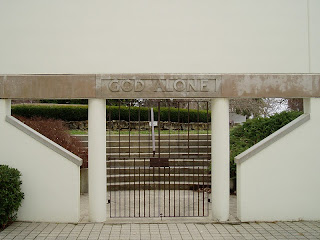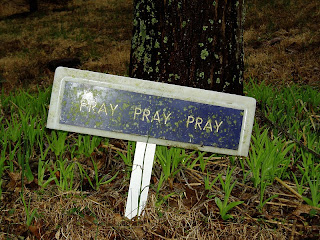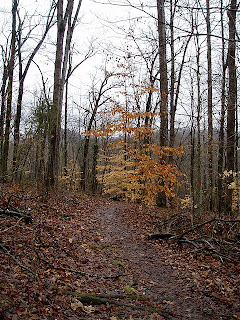Integritas was on the road again this week, this time traveling to Gethsemani, Kentucky for a weekend retreat at the Trappist monastery there. After about seven hours on the bus, we arrived at Gethsemani (about an hour south of Louisville) on Friday night, in time to join the monks for Compline, their last prayer of the day. We knelt in the balcony of their cavernous church, which was in darkness except for the light of the tabernacle and candles lit in front of the icon of Our Lady, Gethsemani's patroness. The monks chanted their last psalms of the day, and when the service concluded, all were welcomed forward to be sprinkled with holy water before going to their beds. This might seem awfully early to college students for a bedtime, but the community rises every morning at 3:15 a.m. for vigils, their first prayers of the day, so turning in early is essential for a long day of work and prayer, lived according to the rhythm of the Liturgy of the Hours.

The monks' life, structured as it is by seven periods of communal prayer each day and Mass, along with work in the fields or making cheese, fruitcakes and fudge, and marked most of all by silence, excluding all idle talk, is radically different from the life of a college student. College is chaotic, spontaneous, unstructured, saturated with information and constant noise: smart phones, mp3 players, and all the distractions of constant internet access. It's not that life on a college campus is busy purely for the sake of being busy: students are pursuing their goals and ideals in the name of education. "God, Country, Notre Dame," read the slogan on the T-shirt of one retreatant. How different from the sign that emblazons the entrance to the cloister of Gethsemani: "God Alone." Waking up at three every morning, praying and working without ceasing, is done at Gethsemani for the sake of God alone: to consecrate every hour of every day to God, intentionally and explicitly. Trappist asceticism strips everything away: sleep, rich food, even church decoration. The simplicity of the church, where they spend most of their waking hours, was striking: bare, white walls, exposed beams, no decoration whatsoever. The stations of the cross were simply small, dark crosses hung up high at intervals along the wall. Even the tabernacle was a plain, black box suspended below the single candle. Their chanting was similarly simple: no harmonizing, no polyphonic parts, just the antiphonal recitation of the psalms, hour after hour.

Gethsemani is a serene and beautiful place; a place where far away from the world's distractions, it is easier to listen to what God is saying and to see how He is working. It invites visitors to give up for a few days their struggle to be individual, to be productive, to be in charge of their own lives, and instead to enter into the ancient tradition of the Liturgy of the Hours: Vigils at 3:15 a.m., Lauds at 5:45 a.m., Eucharist at 6:15 a.m., Terce at 7:30 a.m., Sext at 12:15 p.m., None at 2:15 p.m., Vespers at 5:30 p.m., and Compline at 7:30 p.m. If you stay for two weeks, you will have chanted all 150 psalms. Meals are taken in silence; work is done in silence, so that they pray without ceasing.

God speaks to each of us differently in the silence of our hearts, so I can't say what each student took away from our retreat there. But I can say that I was moved to see them creeping in through the door of the dark chapel at three in the morning, an hour by which they ordinarily would not yet have even gone to bed, to pray the psalms and listen to the Lord, coming to pray in the darkness, before the light of the tabernacle, at every hour of the day and night.
